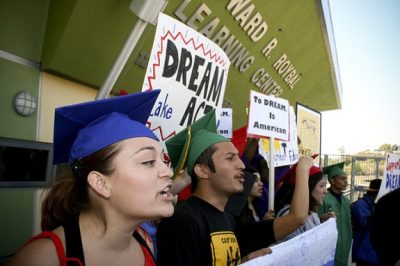Immigration Reform
The last time Congress updated our legal immigration system was November 1990, one month before the World Wide Web went online. We are long overdue for comprehensive immigration reform.
Through immigration reform, we can provide noncitizens with a system of justice that provides due process of law and a meaningful opportunity to be heard. Because it can be a contentious and wide-ranging issue, we aim to provide advocates with facts and work to move bipartisan solutions forward. Read more about topics like legalization for undocumented immigrants and border security below.
California DREAMers Exhibit High Levels of Civic Participation, Yet Face Significant Hardships
By Caitlin Patler, Ph.D. Candidate in Sociology, UCLA There are roughly 5 million undocumented children and young adults currently living in the U.S. today, 24% (or 1.1 million) of whom live in California. As in other states, California’s undocumented youth face a unique and challenging paradox. On one hand, they work hard, excel academically, participate in their communities and have high educational and career aspirations in the only country they’ve ever known. On the other hand, their immigration status severely limits their opportunities, aspirations and ability to contribute fully to U.S. society. A new research brief, co-authored by Veronica Terriquez and this author, highlights the experiences of undocumented youth in California—many of whom disproportionally experience economic and personal hardships. Read More

Secretary Napolitano Clarifies President’s Deferred Action Plan…Again
Today, DHS Secretary Janet Napolitano testified before the House Judiciary Committee and, as expected, defended the administration’s use of prosecutorial discretion and recently announced deferred action policies for qualified DREAMers—fielding questions and accusations from those who would rather take Napolitano to task than focus on creating smart, humane, and effective immigration policies. Read More

Critics Try to Sink Obama’s Deferred Action Program Before It Even Begins
Secretary Janet Napolitano is set to testify before the House Judiciary Committee tomorrow and the number one topic is likely to be the June 15 announcement of Deferred Action for Dreamers. Now that a majority of the Supreme Court has blessed the use of prosecutorial discretion as a legitimate function of the executive branch, critics of deferred action for DREAMers have moved on to a golden oldie: raising the specter of fraud in order to defeat or delay the program. In a recent letter to ICE Director John Morton, Judiciary Chair Lamar Smith argued that the new initiative will invite thousands of undocumented immigrants to fake documents proving that they meet the requirements of the program, likening it to the Special Agricultural Worker legalization program of 1986. By conjuring up ghosts of the past, Congressman Smith not only confuses the nature of legalization and deferred action, but ignores the dramatic changes in immigration adjudication and enforcement that have taken place since 1986. Read More

Civil Rights Groups Resume Legal Challenges to Alabama’s Immigration Law
Less than three weeks after the Supreme Court’s landmark decision in Arizona v. United States—which struck down three provisions of SB 1070 and invited future challenges to a fourth—civil rights groups are back in court resuming their challenges to copycat laws in other states. Going forward, the lawsuits will focus more on how to interpret the Justices’ decision and less on theoretical legal questions about states’ rights. While the cases in Alabama and other states may take years to resolve, it is already clear that parts of the laws will be immediately struck down. Read More

Today We Celebrate Immigrant Men and Women Keeping the American Dream Alive
Countless Americans will celebrate America’s 236th birthday today by joining friends and family for food and fireworks. Many will just enjoy the day, others will recall our Founding Fathers’ declaration of independence, and others will raise their right hand, swear an oath of allegiance, and become citizens of the United States of America. Across the country today, men and women from every corner of the globe will stand side by side and swear to “support and defend the Constitution and laws of the United States of America,” and reminding each and everyone one of us of the power and promise of the American Dream. Read More

According to Scott Beason, Alabamans Will Return to “Menial Jobs” Over Time
Alabama State Senator Scott Beason continues to link the state’s recent dip in unemployment to its extreme immigration law (HB 56), even though there is no evidence to support that this theory. In fact, many Alabama business have reported difficulties in replacing immigrant workers, many of whom have left the state or gone further underground. But in a recent effort to address this reported labor shortage, Sen. Beason—a sponsor of HB 56—managed to insult both immigrants and native Alabamans alike. Read More

Why the Next Einstein Can’t Get a Visa
By Shelby Pasell. Though Einstein may be a household name in the United States, he was not born here, and he would have a hard time obtaining a visa if he were alive today. In fact, inventors behind most patents in the U.S. were born outside of the country, according to a new report by the Partnership for a New American Economy, and most face huge difficulty in obtaining visas to stay. Read More

How Should Obama Administration Proceed with Deferred Action Program?
In a June 15th memo announcing deferred action for immigrant youth, DHS Secretary Janet Napolitano gave USCIS 60 days to come up with a process that will allow these young people to affirmatively apply for the chance to work, study, and live in the U.S. without fear of deportation. To be sure, USCIS staff and their counterparts at ICE, CBP, and DHS, have been entrusted with a difficult job—one that requires balancing legal and practical implementation issues against high expectations and years of built up frustration over the lack of immigration reform. But the real challenge is acknowledging that every single decision they make about the program has the chance to make it harder or easier for young people to realize their dreams. Read More

How the President’s Deferred Action Initiative Will Help the U.S. Economy
President Obama’s June 15 “deferred action” announcement is good not only for the 1.4 million unauthorized children and young adults who have been granted a temporary reprieve from deportation, but also good for the U.S. economy. Each year, tens of thousands of unauthorized students graduate from primary or secondary school, often at the top of their classes. They have the drive and intelligence to become doctors, nurses, teachers, and entrepreneurs, but their lack of legal status has prevented them from attending college or working legally. The President’s deferred action initiative has finally provided them with an opportunity to live up to their full potential and, in the process, earn more, spend more, and pay more in taxes. Read More

In Arizona Case, Supreme Court Affirms Legality of Prosecutorial Discretion
The Supreme Court dealt a blow to the restrictionist movement on Monday by striking down three provisions of Arizona SB 1070 and leaving a fourth vulnerable to future challenge. But in a lesser noticed development, the Court also undercut the arguments of critics who contend the President violated the Constitution by recently directing his administration not to deport otherwise removable immigrants who were brought to the country as children. As the majority opinion confirmed—and not even Justice Scalia denied—the President’s authority to set enforcement priorities is a valid and important aspect of the immigration system. Read More
Make a contribution
Make a direct impact on the lives of immigrants.
